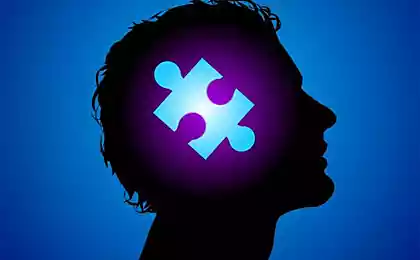610
Syndrome night appetite: the magic ends at midnight
Syndrome night appetite (munchies food): the magic ends at midnight. In our society, night perceive food as a prank or as a given in certain regime of work. Moreover, many are justified by the fact that in the morning no appetite, no time, tired at work, etc. In fact, this is not your personal traits, and manifestations of the disease, which is called night eating syndrome (syndrome of appetite, night), (Night eating syndrome, NES) and is included in the classification of mental diseases. This condition is not as harmless as it seems and can progress, leading to serious health problems.

Night eating syndrome (SNP) was first described in 1955 by albert Standardom, researcher of the problems of overeating of the University of Pennsylvania. This syndrome is at the intersection of mental, nutritional, stress and violations of the regime of the day. Stunkard found that people suffering SNP, consume more than half of his daily allowance of food between dinner and Breakfast the next day, often interrupting sleep for late-night snacking. In the morning they have no appetite, and have Breakfast in the afternoon period. Another sign of the SNP can serve as emotional tension, anxiety and depression, especially in the night time.
About 9% of the population suffer from this syndrome, irrespective of gender and age. Despite the fact that eating disorders have traditionally been considered "women's" disease, the incidence of these disorders among males is also significant. It is studied in this work, we SLEEP. Two studies have shown that SLEEP significantly more often found among men than among women. People suffering from this syndrome, disturbed biological rhythms, hormones and metabolism, there is a state of emotional hypoglycemia.
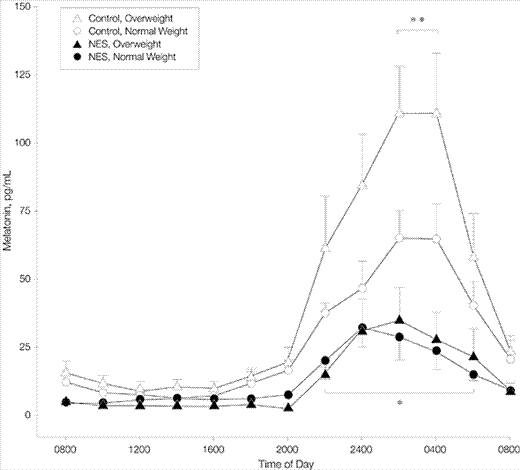
In the next few years Stankard and a number of other researchers have found that people suffering from the SNP, there are hormonal disruptions. Those suffering from NES, disturbed circadian hormonal rhythm that leads to malfunction of the biological clock, and thus to metabolic disorders. In a healthy person in the night time hormone melatonin, allowing a person to sleep. If a person is exposed to SNP, the level of melatonin becomes high enough, as well as the level of the hormone leptin that is responsible for suppressing hunger. At the same time, in humans the levels of the stress hormone cortisol starts to rise during the day and night. Thus, SNP is a complex disorder diet and sleep, as well decreasing stress.
People with night eating syndrome may suffer from overeating. It is now known that despite the tendency of people to obesity, a small percentage of people with normal weight are also susceptible to SNP. Many people suffering from the SNP, there is a belief that: "If I don't eat, can't sleep." Studies have shown that the problem of overeating is more than three times as common among people with SNP than among healthy men. This is comparable to the number of cases of the problem of overeating in humans suffering from such diseases as bulimia.

Experts, including Dr. Stankard co-author of the book "Overcoming Night eating Syndrome", I agree that the first step in dealing with the SNP is the awareness of the existence of the problem. If you suffer from obesity, eat more than half of the food in the night, have difficulty sleeping and don't want to have Breakfast – you can have a SNP. If you are under medical supervision, you may be offered special medical treatment. But independent techniques, such as exercise, deep breathing technique and other methods can help to overcome stress. Restrictions on the time, the meals and amount of food consumed at night and keeping a journal has also proven to be effective.
Unfortunately, SLEEP is not harmless and can cause damage to your health and impair your quality of life, causing an increased risk of obesity and many other diseases. This condition has a negative impact on the function of the stomach and intestines. People with the syndrome night appetite, a tendency toward flatulence and constipation, as due to variance in diet, food remains long in the intestine. In addition, eating just before bedtime can cause the development of gastro-esophagal-reflux disease.
Regular night snacking experts are ready to considered as one of the signs of serious mental disorder. For late-night snacking syndrome is peculiar to that person to sit down and eat late in the evening or late at night, and cannot do without it in physiological and psychological terms. Scientists have concluded that those people who have ineradicable habit to empty the fridge at night, seriously risking one or another mental disorder.
Symptoms of night appetite (food at night).
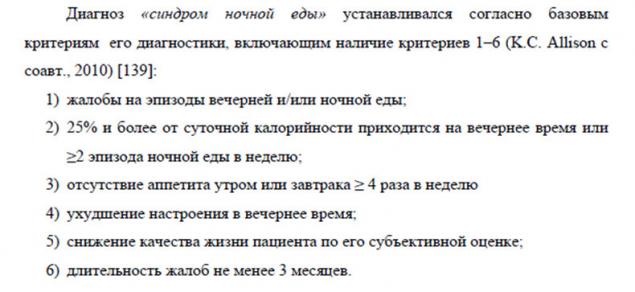
The most common of eating disorders. Night eating syndrome, which plays a major role indigestion belongs to the same group, which includes such diseases as anorexia or bulimia. People with this disorder, usually in the morning, no appetite, 50 % of the calories of the main part of a meal eaten in the afternoon, often Wake up at night from hunger. Due to the lack of appetite in the morning, eat Breakfast very late. Usually once during the 3 nights a week I Wake up and eat. During such waking up, eating high-calorie foods rich in carbohydrates, eat sugar. The disease is accompanied by depression, which weakens in the morning and increases by evening and night. People are in stress they can not see, also can blame themselves and be ashamed because of what you eat at night. Interesting that among patients with no worries about diet or nutrition, while a large part of the obese.
People who suffer from night eating syndrome generally limit the amount of food eaten during the day and then compensate by overeating before bedtime or Wake up in the night to eat. In people with this model of feeding behavior to develop insomnia or sleep disturbance. Many people suffering from this disorder believe that they will not be able to sleep if they eat right.
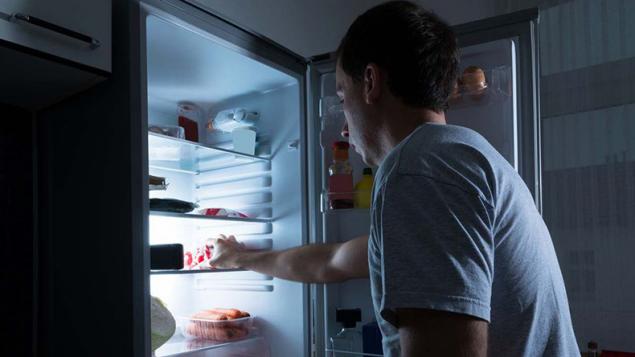
Other symptoms of night eating syndrome are:
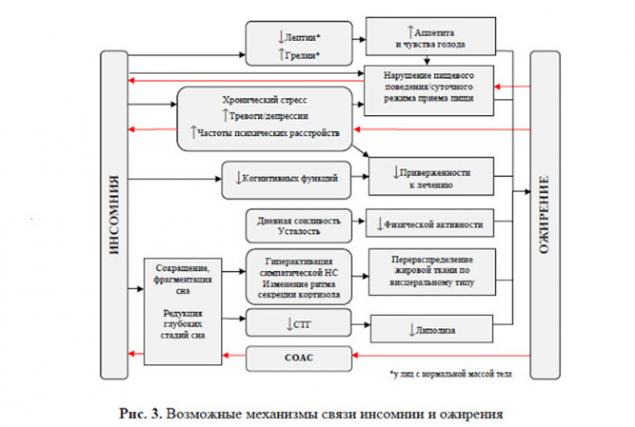
Depression, serotonin syndrome night eating.
American experts conducted a series of studies on the topic of the syndrome night appetite. So, one of them single-photon emission computed tomography showed a significant increase in serotonin transporters in the midbrain of people suffering from the syndrome night appetite.
The increased level of the serotonin Transporter leads to a decrease in postsynaptic serotonin transmission and can disrupt circadian rhythms and a feeling of fullness. Due to the action of the transporters of serotonin, the chemical composition of the brain, the person has depression, anxiety, hostility. These negative emotions, merged with the guilt associated with a non-traditional style of food, form the ideal breeding ground for aggravation of psychological problems.
What comes first: the psychological problem, which causes the syndrome night appetite or poor diet throughout the day? Many people, faced with this syndrome, reported that prior to his appearance they had been through a stressful period in my life. Also the emergence of a syndrome associated with a high level of anxiety and countervailing sense of satisfaction from food.
In order to ease the symptoms of depression, it is necessary to induce the synthesis of serotonin. This is possible with the consumption of large quantities of high carbohydrate, easy to digest food, which leads to increase in glucose, and therefore insulin in the blood plasma. Struggle with a depressed mood can lead to an eating disorder. The majority of people suffering from night eating syndrome, ashamed of their night of gluttony, try to hide the problem from loved ones, which ultimately causes more overeating. In the result cycle, including depressed mood down to depression, eating disorders and obesity.
It is known that depression is also a violation of sleep and appetite.
According to scientists, the gene controlling circadian rhythms, and the gene associated with sleep disorders should work at the same time – because of this synchrony during sleep "shuts off" the desire is there. This condition provokes outbreaks of hunger at night, are forced to RAID the refrigerator. published
Author: Andrey Blueskin
P. S. And remember, just changing your mind — together we change the world! ©
Join us in Facebook , Vkontakte, Odnoklassniki
Source: www.beloveshkin.com/2016/01/sindrom-nochnogo-appetita-nochnogo-zhora.html

Night eating syndrome (SNP) was first described in 1955 by albert Standardom, researcher of the problems of overeating of the University of Pennsylvania. This syndrome is at the intersection of mental, nutritional, stress and violations of the regime of the day. Stunkard found that people suffering SNP, consume more than half of his daily allowance of food between dinner and Breakfast the next day, often interrupting sleep for late-night snacking. In the morning they have no appetite, and have Breakfast in the afternoon period. Another sign of the SNP can serve as emotional tension, anxiety and depression, especially in the night time.
About 9% of the population suffer from this syndrome, irrespective of gender and age. Despite the fact that eating disorders have traditionally been considered "women's" disease, the incidence of these disorders among males is also significant. It is studied in this work, we SLEEP. Two studies have shown that SLEEP significantly more often found among men than among women. People suffering from this syndrome, disturbed biological rhythms, hormones and metabolism, there is a state of emotional hypoglycemia.

In the next few years Stankard and a number of other researchers have found that people suffering from the SNP, there are hormonal disruptions. Those suffering from NES, disturbed circadian hormonal rhythm that leads to malfunction of the biological clock, and thus to metabolic disorders. In a healthy person in the night time hormone melatonin, allowing a person to sleep. If a person is exposed to SNP, the level of melatonin becomes high enough, as well as the level of the hormone leptin that is responsible for suppressing hunger. At the same time, in humans the levels of the stress hormone cortisol starts to rise during the day and night. Thus, SNP is a complex disorder diet and sleep, as well decreasing stress.
People with night eating syndrome may suffer from overeating. It is now known that despite the tendency of people to obesity, a small percentage of people with normal weight are also susceptible to SNP. Many people suffering from the SNP, there is a belief that: "If I don't eat, can't sleep." Studies have shown that the problem of overeating is more than three times as common among people with SNP than among healthy men. This is comparable to the number of cases of the problem of overeating in humans suffering from such diseases as bulimia.

Experts, including Dr. Stankard co-author of the book "Overcoming Night eating Syndrome", I agree that the first step in dealing with the SNP is the awareness of the existence of the problem. If you suffer from obesity, eat more than half of the food in the night, have difficulty sleeping and don't want to have Breakfast – you can have a SNP. If you are under medical supervision, you may be offered special medical treatment. But independent techniques, such as exercise, deep breathing technique and other methods can help to overcome stress. Restrictions on the time, the meals and amount of food consumed at night and keeping a journal has also proven to be effective.
Unfortunately, SLEEP is not harmless and can cause damage to your health and impair your quality of life, causing an increased risk of obesity and many other diseases. This condition has a negative impact on the function of the stomach and intestines. People with the syndrome night appetite, a tendency toward flatulence and constipation, as due to variance in diet, food remains long in the intestine. In addition, eating just before bedtime can cause the development of gastro-esophagal-reflux disease.
Regular night snacking experts are ready to considered as one of the signs of serious mental disorder. For late-night snacking syndrome is peculiar to that person to sit down and eat late in the evening or late at night, and cannot do without it in physiological and psychological terms. Scientists have concluded that those people who have ineradicable habit to empty the fridge at night, seriously risking one or another mental disorder.
Symptoms of night appetite (food at night).

The most common of eating disorders. Night eating syndrome, which plays a major role indigestion belongs to the same group, which includes such diseases as anorexia or bulimia. People with this disorder, usually in the morning, no appetite, 50 % of the calories of the main part of a meal eaten in the afternoon, often Wake up at night from hunger. Due to the lack of appetite in the morning, eat Breakfast very late. Usually once during the 3 nights a week I Wake up and eat. During such waking up, eating high-calorie foods rich in carbohydrates, eat sugar. The disease is accompanied by depression, which weakens in the morning and increases by evening and night. People are in stress they can not see, also can blame themselves and be ashamed because of what you eat at night. Interesting that among patients with no worries about diet or nutrition, while a large part of the obese.
People who suffer from night eating syndrome generally limit the amount of food eaten during the day and then compensate by overeating before bedtime or Wake up in the night to eat. In people with this model of feeding behavior to develop insomnia or sleep disturbance. Many people suffering from this disorder believe that they will not be able to sleep if they eat right.

Other symptoms of night eating syndrome are:
- Rampant appetite for sleep or regular meals at night
- Guilt, anxiety or upset while eating
- The inability to sleep or poor sleep
- The uncontrollable urge to eat something during the night
- More than half of your daily calories comes at a time after dinner
- Weak appetite or lack of it in the morning
- Morning sickness
- Anxiety
- Depression
- Excessive weight gain
- The loss of control over ability to stop eating.
- Morning reluctance to eat.
- Increased appetite in the evening.
- The episodes of uncontrolled eating.
- Nocturnal awakening associated with the sudden appearance of appetite. (Wake-up can be irregular from time to time the person may not Wake up at night, but later, the Wake-up resume).
- Sleep disturbances (superficial, restless, restless sleep with frequent awakenings).

Depression, serotonin syndrome night eating.
American experts conducted a series of studies on the topic of the syndrome night appetite. So, one of them single-photon emission computed tomography showed a significant increase in serotonin transporters in the midbrain of people suffering from the syndrome night appetite.
The increased level of the serotonin Transporter leads to a decrease in postsynaptic serotonin transmission and can disrupt circadian rhythms and a feeling of fullness. Due to the action of the transporters of serotonin, the chemical composition of the brain, the person has depression, anxiety, hostility. These negative emotions, merged with the guilt associated with a non-traditional style of food, form the ideal breeding ground for aggravation of psychological problems.
What comes first: the psychological problem, which causes the syndrome night appetite or poor diet throughout the day? Many people, faced with this syndrome, reported that prior to his appearance they had been through a stressful period in my life. Also the emergence of a syndrome associated with a high level of anxiety and countervailing sense of satisfaction from food.
In order to ease the symptoms of depression, it is necessary to induce the synthesis of serotonin. This is possible with the consumption of large quantities of high carbohydrate, easy to digest food, which leads to increase in glucose, and therefore insulin in the blood plasma. Struggle with a depressed mood can lead to an eating disorder. The majority of people suffering from night eating syndrome, ashamed of their night of gluttony, try to hide the problem from loved ones, which ultimately causes more overeating. In the result cycle, including depressed mood down to depression, eating disorders and obesity.
It is known that depression is also a violation of sleep and appetite.
According to scientists, the gene controlling circadian rhythms, and the gene associated with sleep disorders should work at the same time – because of this synchrony during sleep "shuts off" the desire is there. This condition provokes outbreaks of hunger at night, are forced to RAID the refrigerator. published
Author: Andrey Blueskin
P. S. And remember, just changing your mind — together we change the world! ©
Join us in Facebook , Vkontakte, Odnoklassniki
Source: www.beloveshkin.com/2016/01/sindrom-nochnogo-appetita-nochnogo-zhora.html





